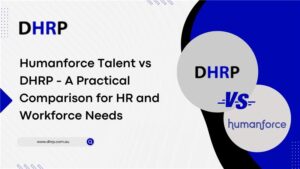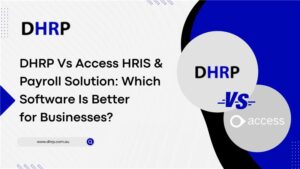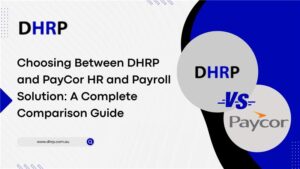Human resources can be a tricky department to manage.
Tracking leave, maintaining compliance, onboarding new staff, and conducting performance management evaluations can rapidly become overwhelming, especially when using outdated technologies and spreadsheets.
This is where HR software features come in. If you find the best combination of features, you can get more than just a database and automate daily mundane tasks without a hassle.
So, below are the challenges HR departments face and let’s explore what features you should look for in HR software in Australia.
HR Departments Face Increasing Pressure to Do More with Less
Managing a modern workforce is no easy task. From recruitment to compliance, HR teams are expected to handle it all—often with limited time and resources.
Common challenges faced by HR departments include:
- Manual and repetitive administrative tasks
- Difficulty tracking employee performance and goals
- Limited visibility into workforce data and insights
- Compliance with constantly evolving labour laws
- Inconsistent onboarding and offboarding processes
- Poor leave and attendance management
- Delays in payroll processing and tax reporting
- Lack of employee engagement and self-service options
What are the Different Types of HR Software?
HR software is readily available in a number of options. Typically, there are three major systems that dominate the digital arena of human resources. These include:
- HRIS - Human Resource Information System
- HCM - Human Capital Management
- HRMS - Human Resource Management System
These systems are not interchangeable. However, they do share some features. The most widespread type of HR software is the Human Resource Information System (HRIS). This system’s primary focus is on employee data organisation, and it may assist small firms with everything from onboarding to payroll and compliance.
Key Features To Have In Modern HR For Australian Businesses
If you are opting for the best HR software for small businesses in Australia and don’t know what features to consider, here is a short list. The rest can be customised with the DHRP HR solution. But the main HR software features you need are:
- Core HR
Core functions is one of the most significant HR software features, encompassing the basic operations or HR tasks in HR departments, as opposed to optional add-ons. Examples include:
- Payroll processing
- Benefits administration
- Employee recruitment scheduling
- Employee training
- Internal relations
- Safety and compliance
A core HR solution, such as Dynamics 365 HR & Payroll, handles and streamlines these critical HR operations, serving as the hub for HR procedures and employee data. In short, it becomes the foundation of your company.
- Time and Attendance
HR software often includes tools for tracking absences and recording hours worked on a timesheet. Ensure that the system can handle corporate policies and practices. Also,, ensure that it can do the following:
- Provide the opportunity to configure all of the company’s absence types.
- Define which absence kinds are applicable to specific employee populations.
- Create schedules and timesheets that capture and display essential information.
- Make timekeeping easy to use on a mobile device or in a browser.
- Provide exception reporting to identify missing shifts, clock-outs, and overtime.
- Configure qualifying requirements and specify statutory holidays by country and region.
- Create approval protocols and reminders for absence requests and completed time sheets.
- Provide a means for tracking where employees spend their time, such as training, meetings, and projects.
- Recruitment and Onboarding
The Human Resource Onboarding software component comprises “Recruitment and Onboarding,” which is all-inclusive; it contains job posting and vacancy management, applicant tracking, resume processing, interview scheduling, and onboarding activities.
Helping with reference checks and background checks speeds up the hiring process and ensures a seamless onboarding experience for new hires.
- Performance Management
The “Performance Management” component in HR and employee management software is critical for goal planning and monitoring, competency exams, performance reviews, 360-degree feedback collection, and performance analytics.
This tool, which utilises a streamlined digital platform, enables companies to track accomplishments, cultivate a culture of ongoing improvement, and promote employee progress.
- Employee Self-Service
Modern HR solutions for Australian businesses often include employee self-service (ESS) portals, a popular feature. These ESS portals enable employees to easily access a range of information, including payroll data and up-to-date time-off and attendance records.
Employees can then handle this information efficiently by submitting time-off requests, downloading tax forms, modifying their schedules, or updating personal information, all of which are accessible via various devices, including smartphones.
This not only gives employees more flexibility but also relieves your HR team of routine administrative duties, saving time and effort while maintaining the accuracy of employee data.
- Leave Management
Regardless of business, managing employee leave these days, when remote and hybrid work are commonplace, can be difficult due to variable schedules and seasonal demands.
Look for HR software that offers comprehensive leave management capabilities, including automated accrual calculations, customisable leave policies, and streamlined request and approval processes.
- Reporting and Analytics
HR software for Australian SMEs should provide powerful reporting and analytics features that enable you to gain insights into your personnel and make data-driven decisions.
Analytics may be an afterthought, but they can provide valuable insights into workforce trends, performance metrics, and other crucial factors that influence decision-making.
- Payroll Management
Effective payroll administration is critical for every business. With the appropriate hr and payroll solutions in Australia, you can expedite your payroll operations while ensuring accuracy every time.
Look for a solution that has automatic calculations, tax filing capabilities, and connectivity with accounting software. These features will save time while also reducing the likelihood of errors and compliance issues.
- Compliance
Choosing a compliance-focused HR and payroll software for your business ensures that your company adheres to applicable local, state, federal, and international standards, providing peace of mind and protecting against potential legal issues and penalties. It is crucial to emphasise, however, that compliance software does not substitute for legal or tax advice.
Conclusion
Choosing the right HR software features can transform your HR operations from manual chaos to seamless efficiency. Whether you’re a small business or a growing enterprise, partnering with an experienced HR implementation specialist ensures that your system is tailored to your unique needs.
At DHRP, we specialise in delivering scalable HR and payroll solutions with advanced features like performance tracking, compliance management, and employee self-service.
Our team ensures a smooth implementation and ongoing support to help your business thrive. With DHRP, you don’t just get software—you get a complete HR solution designed for success.



































































































